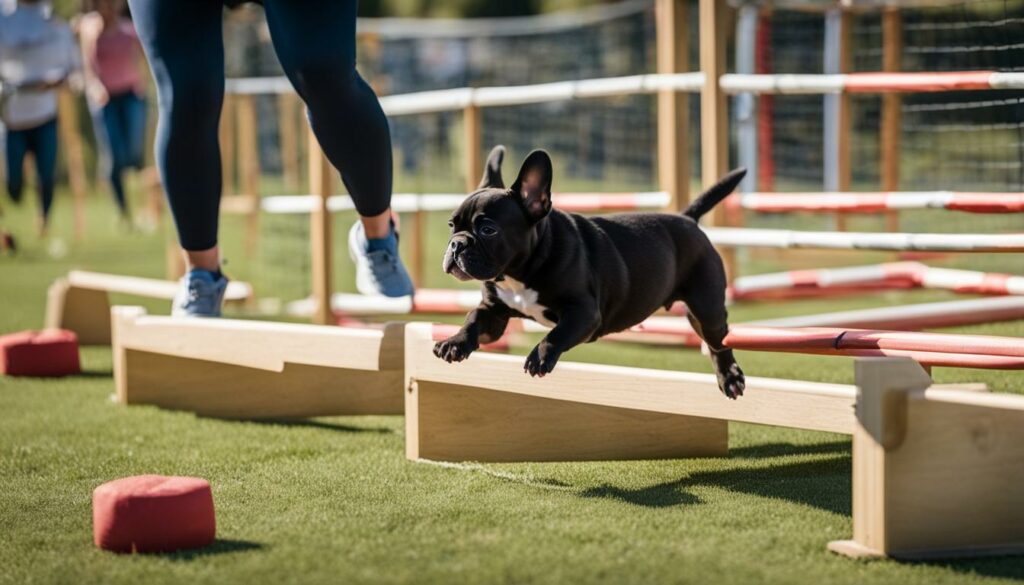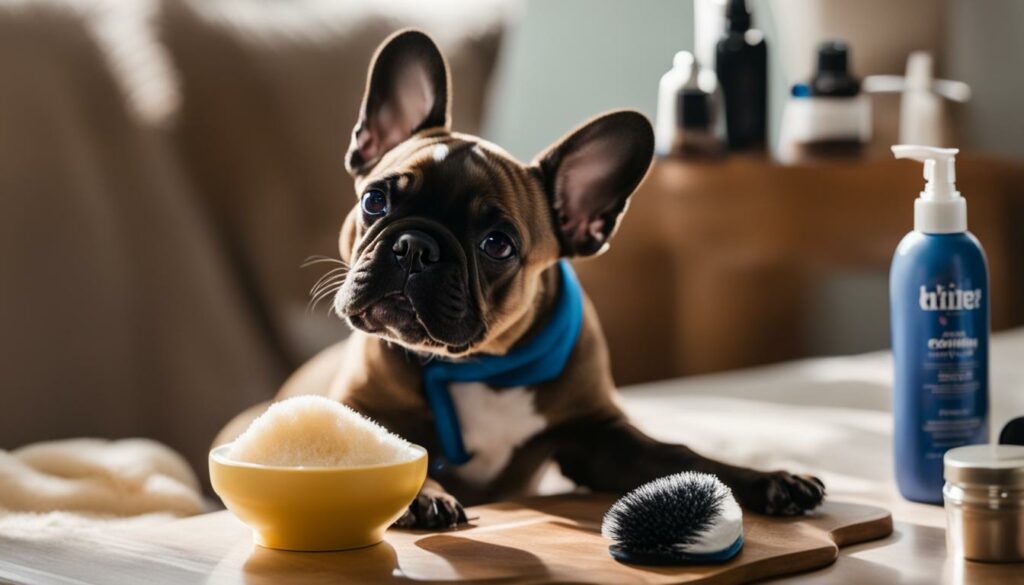
Owning a Frenchie puppy can be an exciting experience. These little dogs are full of energy and love to play. However, with their adorable looks comes the responsibility of taking proper care of them. If you are reading this, you are probably wondering how to take care of a Frenchie puppy, and we have got you covered. This comprehensive guide will provide you with all the best practices for Frenchie puppy care, including feeding, training, grooming, health care, socialization, and exercise. Following these tips and tricks will ensure that your Frenchie puppy is healthy, happy, and well-behaved.
Key Takeaways:
- Feeding your Frenchie puppy requires choosing the right food, portion control, and establishing a feeding schedule.
- Training is a crucial aspect of ensuring your Frenchie puppy grows up well-behaved, including potty training, basic commands, and socialization.
- Grooming your Frenchie puppy involves maintaining their hygiene, including bathing, brushing, nail trimming, and ear cleaning.
- Regular health checkups and vaccinations are essential to keep your Frenchie puppy healthy and prevent common health issues.
- Proper socialization and exercise routines are essential for your Frenchie puppy’s development and well-being.
Feeding a Frenchie Puppy
The health and growth of your Frenchie puppy depend heavily on the right nutrition. An optimal balance of proteins, fats, and carbohydrates, as well as a sufficient intake of vitamins and minerals, are essential. Here are some of the best practices for feeding a Frenchie pup:
Choose the Right Food
When choosing food, look for high-quality, well-balanced products with protein as the primary ingredient. Avoid ingredients that may trigger allergies, such as grains, soybeans, or corn. Some recommended brands include Royal Canin, Wellness Core, and Blue Buffalo.
Portion Control
Proper portion control is critical in preventing overfeeding and obesity. Follow the feeding guidelines on the food label, but also pay attention to your puppy’s individual needs. If your Frenchie is gaining weight too fast, reduce the portion size; if they’re not growing as expected, increase it. Monitor your pup’s body condition score to ensure they are maintaining a healthy weight.
Establish a Feeding Schedule
Establishing a consistent feeding schedule can help regulate your Frenchie’s digestion and prevent stomach issues. We recommend feeding your Frenchie puppy three small meals a day, ideally at the same time each day. Make sure your pup always has access to clean water.
| Food Type | Frequency | Portion Size |
|---|---|---|
| Dry Kibble | 3 times per day | 1/2 to 1 cup per meal |
| Wet Food | Twice per day | 1/4 to 1/2 cup per meal |
Remember, every Frenchie puppy has different nutritional needs, so it’s always best to consult with your veterinarian to determine the best food and feeding plan for your pup.
Training a Frenchie Puppy
Training your Frenchie puppy is crucial to ensure good behavior and obedience in the future. In this section, we will discuss some of the best practices for frenchie puppy care related to training.
One of the first things you should focus on is potty training. A consistent routine and positive reinforcement are key to success. Whenever your puppy does something right, give them a treat, and plenty of praise. Avoid punishing your pup for accidents, as this can be counterproductive. Instead, clean up the mess thoroughly and try to be more vigilant in observing your puppy’s behavior, giving them more frequent potty breaks.
Socialization is also incredibly important for your Frenchie puppy’s overall development. Expose your puppy to different environments, people, and other animals. This will help them become confident and well-adjusted in new situations.
Basic commands such as “sit,” “stay,” and “come” are crucial for your puppy’s safety and will provide mental stimulation. Be patient with your Frenchie puppy, use positive reinforcement, and practice often.

“Training your puppy is a gift that will continue to pay off throughout their life.”
Training Do’s and Don’ts:
| Do: | Don’t: |
|---|---|
| Use positive reinforcement techniques | Use harsh punishment |
| Be consistent with your training routine | Expect immediate results |
| Be patient with your puppy | Raise your voice or yell |
| Use treats to encourage good behavior | Give your puppy too many treats |
| Practice often | Overschedule your puppy’s training sessions |
Grooming a Frenchie Puppy
Grooming your Frenchie puppy is important to keep them healthy and looking their best. Regular grooming not only helps maintain their coat, but it also provides an opportunity to detect any issues early on. In this section, we’ll cover the essential grooming techniques you need to know to help keep your Frenchie puppy looking their best.
Bathing
Bathing your Frenchie puppy should be done every 2 to 3 months to avoid drying out their sensitive skin. Use a mild shampoo recommended by your veterinarian, ensuring that it’s thoroughly rinsed off. Avoid getting water in their eyes and ears to prevent infection or irritation.
Brushing
Brushing your Frenchie puppy’s coat regularly is important to prevent matting and tangling. Use a soft-bristled brush and brush in the direction of the hair growth. Use a metal comb to remove any stubborn knots or tangles.
Nail Trimming
Trimming your Frenchie puppy’s nails is important to avoid overgrowth and potential injury or discomfort. Use a small, sharp pair of dog nail clippers and take care not to cut too close to the nail bed. If you accidentally cut the quick, it can cause bleeding. Use styptic powder to stop the bleeding.
Ear Cleaning
Clean your Frenchie puppy’s ears regularly with a damp cloth or cotton ball. Avoid using q-tips or inserting anything deep into the ear canal to prevent injury. If you notice any signs of ear infection, such as redness, discharge, or a foul smell, contact your veterinarian.

Remember that grooming should be a positive experience for your Frenchie puppy, so take your time and make it enjoyable for them. If you’re unsure about any aspect of grooming, don’t hesitate to ask your veterinarian for advice.
Health Care for Frenchie Puppies
As a Frenchie puppy owner, it is essential to ensure that your furry friend stays healthy and happy. In this section, we will provide you with vital information on how to take care of your Frenchie puppy’s health needs.
Vaccinations
Vaccinations are an essential aspect of Frenchie puppy care. They protect your puppy from various diseases and infections that can be fatal. The veterinarian will recommend specific vaccinations for your Frenchie puppy, including rabies, distemper, and parvovirus. It is essential to follow the vaccination schedule provided by the veterinarian to ensure that your Frenchie puppy is adequately protected.
Preventive Care
Preventive care is crucial to maintain your Frenchie puppy’s health. Regular check-ups with the veterinarian can help identify any potential health issues early on, allowing for prompt treatment. Additionally, flea and tick prevention, as well as heartworm prevention, are essential aspects of preventive care that can help keep your Frenchie puppy healthy and happy.
Common Health Issues
While Frenchie puppies are generally healthy, they may be prone to specific health issues. Some common health issues in Frenchie puppies include respiratory problems, allergies, and skin issues. It is essential to keep an eye out for any symptoms or changes in behavior and consult with the veterinarian promptly.
Caring for Your Frenchie Puppy’s Health
To keep your Frenchie puppy in optimal health, follow these tips:
- Feed your puppy a healthy and balanced diet to maintain a healthy weight
- Provide plenty of fresh water to keep your puppy hydrated
- Give your puppy regular exercise to keep them physically and mentally stimulated
- Regularly groom your Frenchie puppy to maintain their coat and skin health
- Practice preventive care to protect your Frenchie puppy from illnesses and infections
“Your Frenchie puppy’s health and happiness are a top priority. By following the tips and advice provided in this section, you can help ensure that your furry friend stays healthy and happy.”
Socializing a Frenchie Puppy
Socialization is crucial for a Frenchie puppy to develop good behavior and become confident around different people, animals, and environments. The best practice is to start socializing your puppy at an early age, around 3-4 weeks old, and continue through adolescence.
Introduce your Frenchie puppy to new people, especially children, and reward good behavior with treats and praise. Gradually expose your puppy to different animals, such as cats and other dogs, in a controlled environment to ensure safety and supervised play.
Provide new experiences for your puppy, such as car rides, walks in the park, and playtime with toys, to help them become comfortable in different situations and surroundings.
Remember to always supervise your Frenchie puppy during socialization, be patient and consistent, and avoid overwhelming them. With proper socialization, your Frenchie puppy will grow into a well-adjusted and happy adult dog.
Pro Tip: Enrolling your Frenchie puppy in puppy classes or socialization groups can provide great opportunities for socialization and playtime under professional supervision.
Exercise for Frenchie Puppies
Regular exercise is important not only for your Frenchie puppy’s physical health but also their mental well-being. Puppies have high energy levels, and exercise plays a crucial role in burning off that excess energy and reducing destructive behavior.
The appropriate exercise routine for your Frenchie puppy depends on their age, size, and overall health. As a general rule, puppies need about 20-30 minutes of exercise per day, while adult Frenchies need at least 30 minutes to an hour of exercise daily.
One way to ensure your puppy stays active is by taking them on daily walks around the neighborhood or park. Walking not only helps improve your puppy’s physical health but also provides mental stimulation as they explore new sights and smells. If your Frenchie puppy is too small or young for long walks, consider short play sessions in your backyard or indoor playtime.
Mental stimulation is just as important as physical exercise for Frenchie puppies. Consider playing interactive games with your puppy, such as hide and seek or puzzle toys, to keep them mentally active. These activities can help prevent destructive behaviors such as chewing on furniture or shoes.
Incorporating exercise and mental stimulation into your Frenchie puppy’s daily routine can help them lead a happy and healthy life. Just remember to tailor the routine to their individual needs and always consult with your veterinarian for personalized advice.
Conclusion
By following the tips and tricks we shared in this Frenchie Puppy Care Guide, you can ensure that your Frenchie puppy grows into a happy and healthy adult dog. Remember that every puppy is unique, so always consult with your veterinarian for personalized advice. The key to raising a healthy Frenchie is to provide them with proper nutrition, training, grooming, healthcare, socialization, and exercise.
We hope this guide has given you a good understanding of what it takes to care for a Frenchie puppy. Remember that raising a puppy is a journey that requires attention, dedication, and love. Enjoy the process and cherish the moments you spend with your furry companion.
FAQ
How often should I feed my Frenchie puppy?
It is recommended to feed your Frenchie puppy three times a day until they are around six months old. After six months, you can transition to feeding them twice a day. Always follow the feeding guidelines provided by your veterinarian and adjust the portion size based on your puppy’s age, weight, and activity level.
How do I potty train my Frenchie puppy?
Consistency and patience are key when potty training your Frenchie puppy. Establish a routine, take them out frequently, and reward them for eliminating in the desired spot. Supervise them closely indoors and be consistent with praise and positive reinforcement. Accidents may happen, so it’s important not to punish your puppy, but rather redirect their behavior and clean any accidents thoroughly.
How often should I groom my Frenchie puppy?
Frenchie puppies have a short, smooth coat that requires minimal grooming. However, regular brushing is still beneficial to remove loose hair and stimulate the skin. Bathe your Frenchie puppy once every 4-6 weeks or as needed, and trim their nails regularly. Additionally, clean their ears and brush their teeth to maintain their overall hygiene.
When should I start socializing my Frenchie puppy?
It is crucial to start socializing your Frenchie puppy from a young age to ensure they grow up to be well-adjusted and friendly dogs. Begin socialization as early as 8-12 weeks old by introducing your puppy to different people, animals, environments, and experiences. Enroll them in puppy classes or playgroups to enhance their social skills and confidence.
How much exercise does a Frenchie puppy need?
Frenchie puppies have moderate exercise needs. Aim for around 30 minutes to an hour of daily exercise, which can include walks, playtime, and mental stimulation activities. However, be mindful of their brachycephalic (short-nosed) anatomy and avoid rigorous exercise in hot weather to prevent overheating. Always consult with your veterinarian regarding exercise recommendations for your specific Frenchie puppy.
